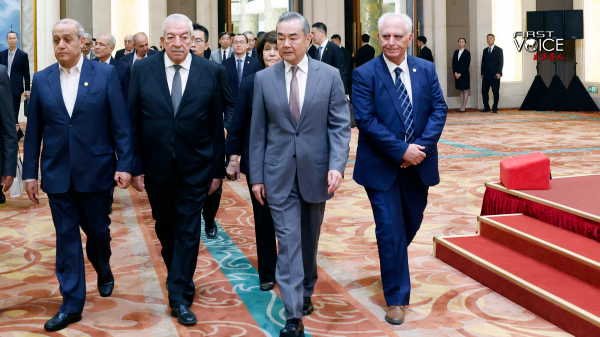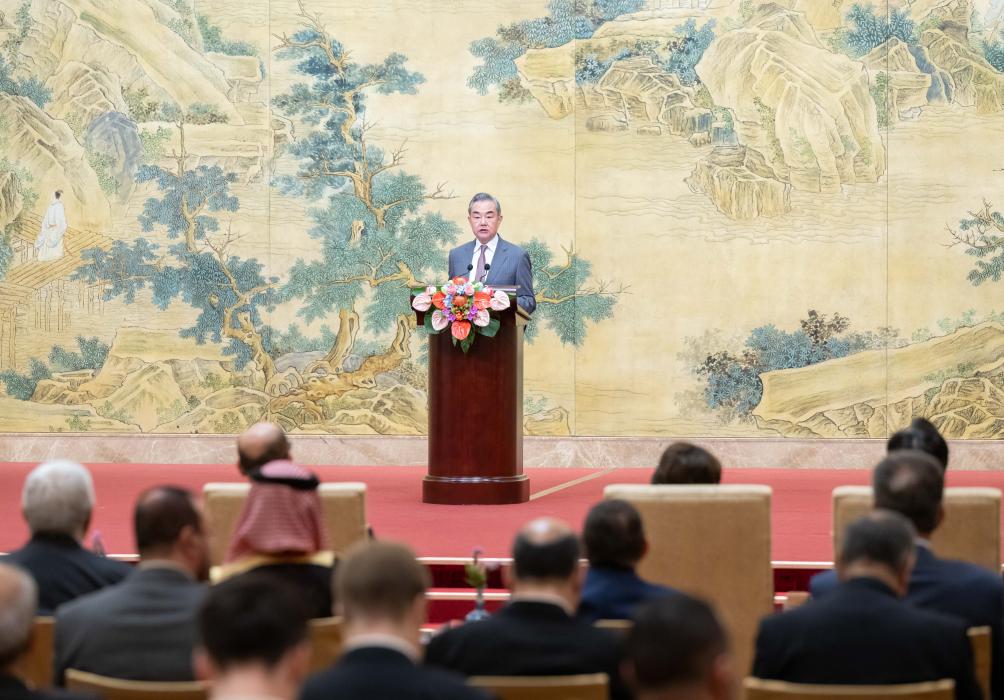
Chinese Foreign Minister Wang Yi attends the closing meeting of the reconciliation dialogue among Palestinian factions in Beijing, China, July 23, 2024. [Photo/Chinese Foreign Ministry]
Editor's note: CGTN's First Voice provides instant commentary on breaking stories. The column clarifies emerging issues and better defines the news agenda, offering a Chinese perspective on the latest global events.
At China's mediation, representatives from Hamas, Fatah and other Palestinian factions signed a joint statement in Beijing, agreeing to end years-long divisions and form a national unity government.
The statement, or the Beijing Declaration, has been largely welcomed. Upon its signing, Palestine parties and the international community acknowledged the significance of the Beijing Declaration in ending bloodshed and promoting the peace process in the Middle East, and spoke highly of China's role as a global mediator.
Hamas spokesperson Hossam Badran said on Telegram that the Declaration was an "additional positive step on the path to achieving Palestinian national unity," stressing that "the most important" part of what was agreed was to form a Palestinian national consensus government.
Mustafa Barghouti, general secretary of the Palestinian National Initiative (PNI), one of the 14 factions signing the agreement, said in an interview with Al Jazeera that the agreement goes "much further" than any other reached in recent years. Barghouti believes the move towards a unity government is especially important as it "blocks Israeli efforts to create some sort of collaborative structure against Palestinian interests."
"This (Beijing Declaration) is an important step towards furthering Palestine unity," Stephane Dujarric, the spokesperson for the UN Secretary-General António Guterres commented, adding that Palestine unity is "crucial for peace and security and for advancing the aspirations of the Palestinian people for self-determination and for a fully independent, democratic, contiguous, viable, and sovereign Palestinian state."
From the détente between Iran and Saudi Arabia, to the reconciliation wave in the Middle East, and to the Beijing Declaration clinched on Tuesday, China has demonstrated its capability of being a global mediator and its determination for global peace and stability; and this is recognized by the international community.
"We highly appreciate the Chinese position and Chinese support. Without Chinese help, it would have been very difficult for us to reach this agreement … We highly appreciate the role of China and we thank China for its role," Barghouti told CGTN on Tuesday.
On behalf of the UN Secretary-General, Dujarric also expressed appreciation toward the efforts made by the People's Republic of China, as well as efforts of other countries involved in facilitating the process.
Jeffrey Sachs, director of the Center for Sustainable Development at Columbia University, spoke highly of China's role as a global mediator. "China has pulled two rabbits out of the hat in the Middle East," with one being the reconciliation between Saudi Arabia and Iran – which the U.S. "could never have imagined or done" – and the Beijing Declaration being the other one, Sachs said in an interview with CGTN.
The reconciliation between Fatah and Hamas in forming a unity front is "extremely positive and important," showing that China "is increasingly able to broker peace, and to find solutions to problems that America calls impossible or irreconcilable," Sachs said.

Chinese Foreign Minister Wang Yi, also a member of the Political Bureau of the Communist Party of China Central Committee, attends the closing ceremony of a reconciliation dialogue among Palestinian factions and witnesses the signing of a declaration on ending division and strengthening unity by 14 Palestinian factions, in Beijing, capital of China, July 23, 2024. [Photo/Xinhua]
But, despite the applause from the region and across the world, certain countries are not so happy to see the clinching of the Beijing Declaration. The U.S. has openly expressed its refusal to accept any Palestine government that includes Hamas – even now that the Palestinian internal rivals have reconciled and agreed to strive for national peace and unity.
And there have never been lack of naysayers on China's efforts – in certain Western media's coverage, China's peace-broker endeavor is even depicted as an attempt to challenge the U.S. and fill the "power vacuum" in the Middle East. "China enjoys coordinating anti-American forces and disrupting U.S. diplomacy," The Wall Street Journal said in its editorial.
Such reaction is no surprise. For an increasing number of Middle Eastern countries, the U.S. is no longer a trusted broker. Unwilling to accept this fact, certain Westerners have resorted to a China-blame game.
"Now the U.S. is being cornered, because China is showing there is a way to do diplomacy, there is a way to answer questions, (and) there is a way to move forward," Sachs said.
"China's Middle East policy is obviously different from that of the West," The Washington Post quoted Tang Zhichao, an analyst at the Chinese Academy of Social Sciences, as saying. "There is an urgent need to reverse a lack of mediation by the international community" brought about in part by the Western world's geopolitical marginalization of the Palestinian issue, Tang said.
No matter how the U.S. grumbles, the clinching of the Beijing Declaration proves that China is a trusted peacemaker in some of the world's most intractable conflicts, and its efforts in securing global peace are recognized by the international community. Instead of blaming China, the U.S. may need to learn to live with this fact.

 中文
中文



